微信出手,上架即秒空!腾讯张军“求谅解”
HarmonyOS NEXT 版微信,来了!
10月12日,微信鸿蒙原生版上架华为应用市场,版本号1.0.0.36,用户可以通过华为应用市场(AppGallery)->【我的】-> 【应用尝鲜】中下载体验。
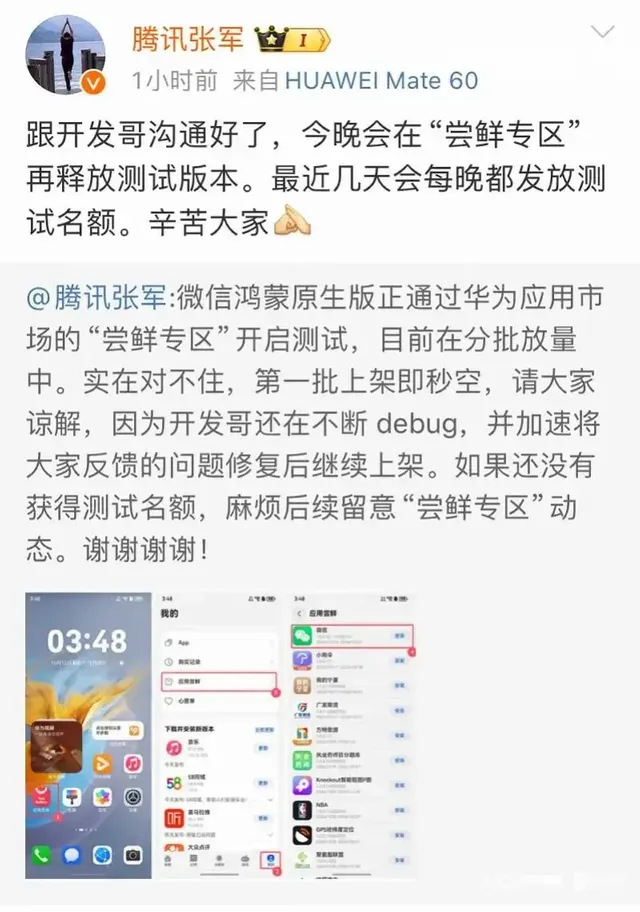
据IT之家报道,微信鸿蒙原生版12日下午正式上架鸿蒙原生应用市场,该版本支持聊天记录迁移,支持直接调用系统原相机、鸿蒙原生安全等功能。
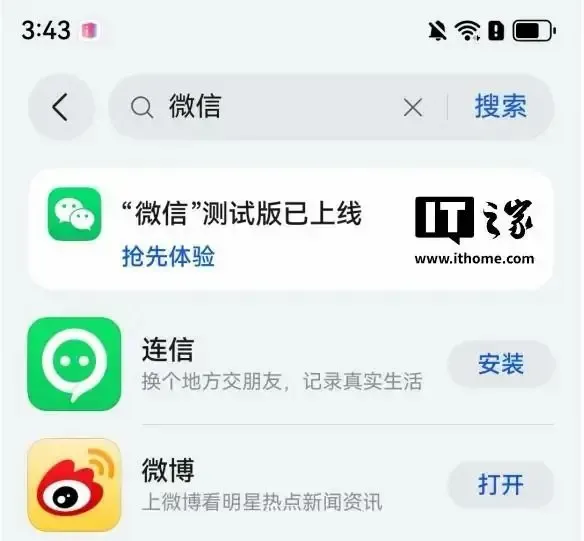
12日傍晚,腾讯公司公关总监张军发文称,微信鸿蒙原生版正通过华为应用市场的“尝鲜专区”开启测试,目前在分批放量中。“实在对不住,第一批上架即秒空,请大家谅解,因为开发哥还在不断debug(调试),并加速将大家反馈的问题修复后继续上架。如果还没有获得测试名额,麻烦后续留意‘尝鲜专区’动态。”
据南方都市报报道,此前便有消息传出,华为与腾讯就微信鸿蒙原生应用的开发合作,在谈判达成一项协议,但协议的具体内容还不可知。从目前的情况来看,双方的合作谈判已经取得了突破性进展。
腾讯超20款产品在不断适配迭代HarmonyOS NEXT
10月8日上午,华为的原生鸿蒙操作系统(HarmonyOS NEXT)正式开始公测,首批公测机型包括华为Mate 60系列、华为Mate X5系列和华为MatePad Pro 13.2英寸系列。
同日,微信鸿蒙原生版也正式开始邀请内测,已升级至原生鸿蒙操作系统HarmonyOS NEXT的用户,可在收到邀请后抢先体验。这款“尝鲜版”的微信,已包含基础社交通讯、音视频通话、朋友圈、微信支付的二维码收/付款等功能。
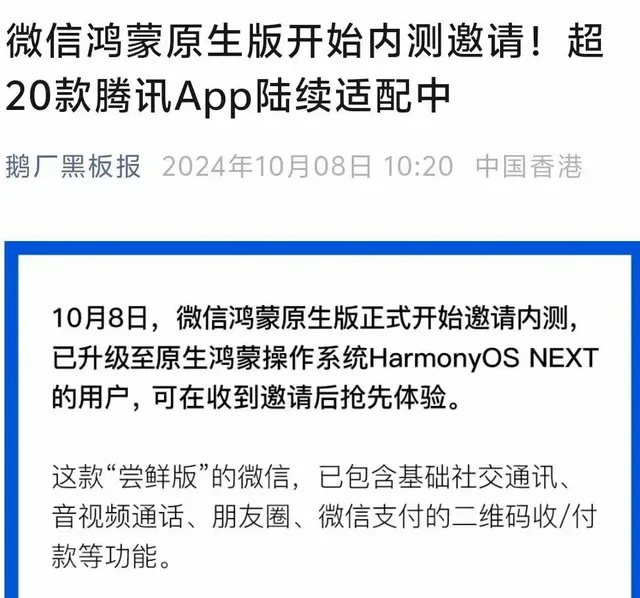
据南方都市报报道,腾讯方面介绍,目前,微信、QQ、腾讯会议、企业微信、腾讯视频、腾讯新闻、腾讯体育、QQ浏览器、搜狗输入法、腾讯自选股、理财通、腾讯广告、QQ音乐、酷狗音乐、酷我音乐、全民K歌、懒人听书、起点读书、QQ阅读、微信读书、微信输入法等超过20款产品在不断适配迭代HarmonyOS NEXT,在确保产品稳定和用户体验前提下,腾讯将在后续版本中陆续更新完善。
此外,在华为与腾讯的合作谈判中,鸿蒙生态也与微信生态面临直接的竞争。比如鸿蒙操作系统中的桌面卡片、实况窗、负一屏,元服务直接调用第三方APP应用,可调用的底层能力涵盖3000+ API,50+场景化控件。这与微信的浮窗、下拉菜单、小程序功能高度相似。当微信接入鸿蒙操作系统,小程序作为微信生态的重要入口,势必被分流。
此前有关双方合作谈判的消息称,腾讯方面要求允许微信在鸿蒙操作系统上全面运行,而无需分享任何收入,作为交换,腾讯要持续维护和更新应用。华为的让步则是为了进一步夯实其在中国移动操作系统市场的地位。
目前,双方合作的谈判协议还不可知,而从微信鸿蒙原生版正式上架华为应用市场,可见双方合作已经找到了共赢的平衡点。
华为鸿蒙原生应用进入全面冲刺阶段
今年6月21日,在华为开发者大会上,华为宣布,鸿蒙NEXT面向开发者启动Beta(测试),华为Mate 60系列、Mate X5、MatePad Pro 13.2英寸等多款设备即日开启升级。而原生鸿蒙面向消费者的正式版,将于今年第四季度正式商用。
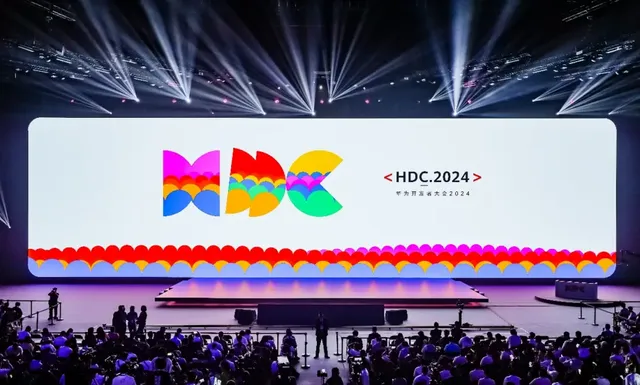
这是HarmonyOS自诞生以来的最大一次升级换代。HarmonyOS NEXT不依赖传统的Unix内核和Linux内核,而是依靠自主的鸿蒙内核。这就意味着,鸿蒙操作系统最终将去掉Linux内核以及安卓的AOSP代码,不兼容安卓,成为“纯血”鸿蒙。
会上,余承东也给出了HarmonyOS NEXT(纯血鸿蒙)的商业时间线:今年8月,将启动面向消费者的HarmonyOS NEXT Beta版;今年第四季度,随着华为Mate 70系列的上市,HarmonyOS NEXT正式版本将走向大规模商用,华为Mate 70系列也将搭载HarmonyOS NEXT;到2025年,将有更多机型升级和搭载HarmonyOS NEXT。
值得注意的是,10月8日,原生鸿蒙操作系统(HarmonyOS NEXT)正式开始公测。而为了冲刺原生鸿蒙商用的“最后一公里”,进一步繁荣鸿蒙生态,华为在10月10日发布了鸿蒙原生应用开发者激励计划。
具体激励计划分为基础激励、创新激励以及应用活跃激励,满足相关评选标准即有机会获得现金激励、专属流量扶持——最高可获百万现金和价值500万流量激励。
据介绍,在计划要求时间提交报名且在2024年10月10日至2024年12月31日完成鸿蒙原生应用开发,上架至HarmonyOS NEXT 应用市场, 且满足相关评选标准即有机会获得对应专属激励。
最新的数据显示,截至目前,已有超1万个应用和元服务上架HarmonyOS NEXT应用市场,可满足用户99.9%的使用时长。
鸿蒙OS在中国市场份额增长
已首次超过iOS
9月25日,华为在深圳举行了鸿蒙千帆会战誓师大会,这标志着鸿蒙生态正加速迈向全面商用的新征程。
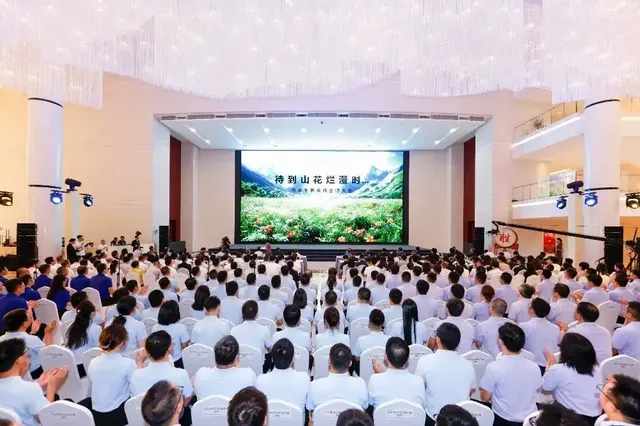
当天,百度、哔哩哔哩、钉钉、东方财富、京东集团、金山办公、快手、美团、支付宝、深开鸿、腾讯、网易集团、微博等鸿蒙合作伙伴都参加了本次誓师大会。
回顾来看,今年鸿蒙确实在生态之路上狂奔,彻底告别安卓,形成完全独立的原生鸿蒙,堪称脱胎换骨。
一方面,开发者应用上看,目前鸿蒙原生应用已经覆盖了18个垂直领域,实现出行、社交、金融、办公、生活、娱乐等18大垂域全覆盖,这些应用包括淘宝、支付宝、抖音、今日头条、腾讯视频、小红书、美团、WPS等等。
另一方面,在华为各大核心终端产品线上,鸿蒙都在逐步扩张。
最受关注的手机方面,Counterpoint数据显示, 鸿蒙操作系统在2024年第一季度继续保持强劲增长态势,全球市场份额成功突破4%。在中国市场,得益于华为旗舰产品的热销,鸿蒙首次超越iOS,成为市场第二大操作系统。
再看2024年全球高级智能手表市场,Counterpoint预测,虽然Apple WatchOS目前占据主导地位,但今年鸿蒙OS和谷歌Wear OS平台的采用率在不断增长。其中,鸿蒙OS在中国市场份额的增长,得益于华为智能手表的普及。
Counterpoint副总监Ethan Qi表示:“2023年,鸿蒙OS的整体出货量增长了近两倍,超过了Apple的WatchOS。预计到2024年,鸿蒙OS在中国的出货量份额将进一步从2023年的48%增长到61%。”
PC鸿蒙也传来新消息,近日在华为三折叠屏手机的交付仪式上,余承东谈道,由于制裁的影响,目前的华为PC或将是最后一批搭载Windows系统的笔记本电脑,后续将会有鸿蒙系统的PC产品。
与此同时,今年以来,资本市场上鸿蒙概念的股票也经历了多轮大涨和震荡。9月25日,常山北明涨停,神州信息、同花顺、拓维信息、软通动力、诚迈科技等跟涨;9月26日,润和软件、金山办公、中科创达等涨幅靠前。
当前,HarmonyOS NEXT还在持续迭代与升级,华为也继续招揽更多开发者、进一步建设生态。鸿蒙作为全新的操作系统门派,面对挑战的同时也开启新机遇,开发者们也在加速参与到智能终端操作系统发展的历程中。
HarmonyOS NEXT version of WeChat is here!
On October 12, WeChat Hongmeng native version was launched on Huawei App Market, version number 1.0.0.36, users can download and experience it through Huawei App Market (AppGallery) -> [My] -> [App Trial].
According to IT Home, WeChat Hongmeng native version was officially launched on the Hongmeng native App Market in the afternoon of the 12th. This version supports chat history migration, direct call of system original camera, Hongmeng native security and other functions.
In the evening of the 12th, Tencent's public relations director Zhang Jun posted that WeChat Hongmeng native version is being tested through the "Trial Zone" of Huawei App Market, and is currently being released in batches. "I'm really sorry that the first batch was sold out in seconds. Please understand that the developer is still debugging and accelerating the fixes of the problems reported by everyone. If you haven't got a test spot yet, please pay attention to the "Freshmen Zone" dynamics."
According to Southern Metropolis Daily, there was news that Huawei and Tencent had reached an agreement on the development cooperation of WeChat Hongmeng native applications, but the specific content of the agreement is still unknown. From the current situation, the cooperation negotiations between the two parties have made a breakthrough.
More than 20 Tencent products are constantly adapting and iterating HarmonyOS NEXT
On the morning of October 8, Huawei's native Hongmeng operating system (HarmonyOS NEXT) officially started public testing. The first batch of public testing models include Huawei Mate 60 series, Huawei Mate X5 series and Huawei MatePad Pro 13.2-inch series.
On the same day, WeChat Hongmeng native version also officially started inviting internal testing. Users who have upgraded to the native Hongmeng operating system HarmonyOS NEXT can experience it first after receiving the invitation. This "early trial version" of WeChat already includes basic social communication, audio and video calls, Moments, and QR code collection/payment functions of WeChat Pay.
According to the Southern Metropolis Daily, Tencent introduced that at present, more than 20 products including WeChat, QQ, Tencent Conference, Enterprise WeChat, Tencent Video, Tencent News, Tencent Sports, QQ Browser, Sogou Input Method, Tencent Stock Selection, Wealth Management, Tencent Advertising, QQ Music, Kugou Music, Kuwo Music, National K Song, Lazy Listening, Qidian Reading, QQ Reading, WeChat Reading, WeChat Input Method, etc. are constantly adapting and iterating HarmonyOS NEXT. On the premise of ensuring product stability and user experience, Tencent will update and improve in subsequent versions.
In addition, in the cooperation negotiations between Huawei and Tencent, the Hongmeng ecosystem also faces direct competition with the WeChat ecosystem. For example, the desktop cards, live windows, and negative one screen in the Hongmeng operating system, the meta-service directly calls third-party APP applications, and the underlying capabilities that can be called cover 3000+ APIs and 50+ scenario-based controls. This is highly similar to the floating window, drop-down menu, and mini-program functions of WeChat. When WeChat is connected to the Hongmeng operating system, mini programs, as an important entrance to the WeChat ecosystem, are bound to be diverted.
According to previous news about the cooperation negotiations between the two parties, Tencent requested that WeChat be allowed to run fully on the Hongmeng operating system without sharing any revenue. In exchange, Tencent must continue to maintain and update the application. Huawei's concession is to further consolidate its position in the Chinese mobile operating system market.
At present, the negotiation agreement for the cooperation between the two parties is still unknown, but from the official launch of the Hongmeng native version of WeChat on the Huawei App Market, it can be seen that the cooperation between the two parties has found a win-win balance.
Huawei's Hongmeng native application enters the full sprint stage
On June 21 this year, at the Huawei Developer Conference, Huawei announced that Hongmeng NEXT will launch Beta (testing) for developers, and Huawei Mate 60 series, Mate X5, MatePad Pro 13.2 inches and other devices will start upgrading today. The official version of the native Hongmeng for consumers will be officially commercialized in the fourth quarter of this year.
This is the biggest upgrade of HarmonyOS since its birth. HarmonyOS NEXT does not rely on traditional Unix kernels and Linux kernels, but relies on the independent Hongmeng kernel. This means that the Hongmeng operating system will eventually remove the Linux kernel and Android's AOSP code, become incompatible with Android, and become a "pure-blooded" Hongmeng.
At the meeting, Yu Chengdong also gave the commercial timeline of HarmonyOS NEXT (pure-blooded Hongmeng): in August this year, the consumer-oriented HarmonyOS NEXT Beta version will be launched; in the fourth quarter of this year, with the launch of the Huawei Mate 70 series, the official version of HarmonyOS NEXT will be commercially available on a large scale, and the Huawei Mate 70 series will also be equipped with HarmonyOS NEXT; by 2025, more models will be upgraded and equipped with HarmonyOS NEXT.
It is worth noting that on October 8, the native Hongmeng operating system (HarmonyOS NEXT) officially started public testing. In order to sprint the "last mile" of native Hongmeng commercialization and further prosper the Hongmeng ecosystem, Huawei released the Hongmeng native application developer incentive plan on October 10.
The specific incentive plan is divided into basic incentives, innovation incentives and application active incentives. If you meet the relevant selection criteria, you will have the opportunity to receive cash incentives and exclusive traffic support - up to one million cash and 5 million worth of traffic incentives.
According to reports, if you submit your application within the required time of the plan and complete the development of Hongmeng native applications between October 10, 2024 and December 31, 2024, and put them on the HarmonyOS NEXT application market, and meet the relevant selection criteria, you will have the opportunity to receive corresponding exclusive incentives.
The latest data shows that as of now, more than 10,000 applications and meta-services have been listed on the HarmonyOS NEXT application market, which can meet 99.9% of the user's usage time.
Hongmeng OS's market share in China has increased
It has surpassed iOS for the first time
On September 25, Huawei held the Hongmeng Qianfan Battle Swearing-in Ceremony in Shenzhen, which marked that the Hongmeng ecosystem is accelerating towards a new journey of full commercialization.
On that day, Hongmeng partners such as Baidu, Bilibili, DingTalk, Eastmoney, JD Group, Kingsoft Office, Kuaishou, Meituan, Alipay, Shenzhen Kaihong, Tencent, NetEase Group, and Weibo all participated in the swearing-in ceremony.
Looking back, Hongmeng has indeed been running wild on the ecological road this year, completely bidding farewell to Android and forming a completely independent native Hongmeng, which can be said to be reborn.
On the one hand, from the perspective of developer applications, Hongmeng native applications have now covered 18 vertical fields, achieving full coverage of 18 vertical fields such as travel, social, finance, office, life, and entertainment. These applications include Taobao, Alipay, Douyin, Toutiao, Tencent Video, Xiaohongshu, Meituan, WPS, etc.
On the other hand, Hongmeng is gradually expanding in Huawei's major core terminal product lines.
In terms of the most popular mobile phones, Counterpoint data shows that the Hongmeng operating system will continue to maintain a strong growth trend in the first quarter of 2024, and its global market share will successfully exceed 4%. In the Chinese market, thanks to the hot sales of Huawei's flagship products, Hongmeng surpassed iOS for the first time and became the second largest operating system in the market.
Looking at the global advanced smartwatch market in 2024, Counterpoint predicts that although Apple WatchOS currently dominates, the adoption rate of Hongmeng OS and Google Wear OS platforms is growing this year. Among them, the growth of Hongmeng OS's market share in China is due to the popularity of Huawei smartwatches.
Counterpoint Deputy Director Ethan Qi said: "In 2023, the overall shipments of Hongmeng OS increased by nearly two times, surpassing Apple's WatchOS. It is expected that by 2024, Hongmeng OS's shipment share in China will further increase from 48% in 2023 to 61%."
PC Hongmeng also has new news. Recently, at the delivery ceremony of Huawei's three-fold screen mobile phone, Yu Chengdong said that due to the impact of sanctions, the current Huawei PC may be the last batch of laptops equipped with Windows system, and there will be PC products with Hongmeng system in the future.
At the same time, stocks of Hongmeng concept in the capital market have also experienced multiple rounds of surges and shocks since the beginning of this year. On September 25, Changshan Beiming hit the daily limit, followed by Shenzhou Information, Tonghuashun, Tuowei Information, Neusoft, and Chengmai Technology; on September 26, Runhe Software, Kingsoft Office, and Thundersoft were among the top gainers.
Currently, HarmonyOS NEXT is still continuing to iterate and upgrade, and Huawei continues to attract more developers and further build the ecosystem. As a new operating system school, Hongmeng has opened up new opportunities while facing challenges, and developers are also accelerating their participation in the development of smart terminal operating systems.